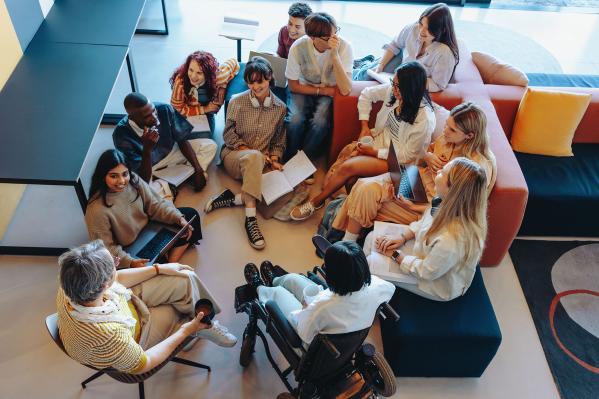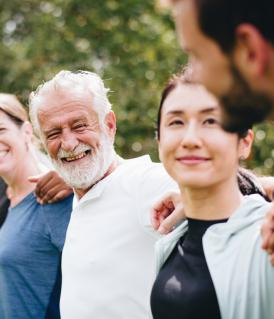How can one get involved in politics in Germany?

How can one get involved in political parties in Germany?
Political partiesplay a central role in Germany’s political system. “ Political parties Political parties According to the Basic Law it is the task of the political parties to participate in political will formation by the people. As such, putting forward candidates for political office and the organization of election campaigns both have the status of constitutional tasks. For this reason the parties… Read more › shall participate in the formation of the political will of the people,” states Article 21 of the country’s Basic Law. This obliges them to uphold their own internal democracy: committees, chairpersons and candidates are elected in secret ballots by delegates of the party membership at party conferences. To strengthen this internal democracy, parties have recently taken to consulting their members directly on important decisions.
Political parties enable citizens to get actively involved in politics and political decision-making processes. Some 1.3 million people in Germany are active in political parties Political parties According to the Basic Law it is the task of the political parties to participate in political will formation by the people. As such, putting forward candidates for political office and the organization of election campaigns both have the status of constitutional tasks. For this reason the parties… Read more › . Most parties also have their own youth organisation.
What is meant by passive voting rights?
Passive voting rights enable a person to be voted into political office. A person who wishes to become a member of the Bundestag The Bundestag The Bundestag is made up of the elected representatives of the German people. In principle elections to the Bundestag are proportionally representative, with each party’s share of the vote in the election reflecting the number of seats it occupies in the parliament. But the electoral system also… Read more › must be at least 18 years old and have German citizenship. Members of the Bundestag are nearly always party members, though it is not obligatory to belong to a party to be elected.
Who can vote in Germany?
All citizens eligible to vote in Germany have the chance to co-determine the country’s political direction by taking advantage of their active voting rights. In principle, all Germans aged 18 or above can vote in Bundestag elections. Municipal elections Elections Every four years, the parties stand in the general elections to the Bundestag. Traditionally, the turn-out is high in Germany, and following a high in the 1970s, when the turn-out was over 90 percent, since reunification it has been around 80 percent. 76.6 per cent of eligible voters took part… Read more › are also open to citizens of other EU countries resident in Germany, and in many federal states Federal states Germany is a federal state. Both the central federal government and the 16 federal states have independent areas of jurisdiction. The government in Berlin is responsible for foreign policy, European policy, defense, justice, employment, social affairs, tax and health. The federal states are… Read more › the minimum age for voting in municipal elections is 16.
How high is voter turnout in Germany?
Voter turnout in Germany is relatively high by international standards. 82.5 percent of those eligible to vote went to the ballot box during the Bundestag The Bundestag The Bundestag is made up of the elected representatives of the German people. In principle elections to the Bundestag are proportionally representative, with each party’s share of the vote in the election reflecting the number of seats it occupies in the parliament. But the electoral system also… Read more › elections Elections Every four years, the parties stand in the general elections to the Bundestag. Traditionally, the turn-out is high in Germany, and following a high in the 1970s, when the turn-out was over 90 percent, since reunification it has been around 80 percent. 76.6 per cent of eligible voters took part… Read more › in February 2025. The average turnout for the Landtag elections in Germany’s 16 federal states Federal states Germany is a federal state. Both the central federal government and the 16 federal states have independent areas of jurisdiction. The government in Berlin is responsible for foreign policy, European policy, defense, justice, employment, social affairs, tax and health. The federal states are… Read more › is 68 percent. In the European elections in June 2024, voter turnout was 64.7 percent in Germany, while the EU average was 50.7 percent.
Which opportunities for political participation does Germany offer besides parties and elections?
Besides political parties Political parties According to the Basic Law it is the task of the political parties to participate in political will formation by the people. As such, putting forward candidates for political office and the organization of election campaigns both have the status of constitutional tasks. For this reason the parties… Read more › and elections Elections Every four years, the parties stand in the general elections to the Bundestag. Traditionally, the turn-out is high in Germany, and following a high in the 1970s, when the turn-out was over 90 percent, since reunification it has been around 80 percent. 76.6 per cent of eligible voters took part… Read more › , there are numerous other opportunities to get involved in politics and the life of society in Germany. For example, around 25 million people volunteer in 620,000 associations with over 50 million members. Germans are also active in thousands of clubs, unions, action groups, foundations, forums and interest groups. Opportunities to participate in youth parliaments, civil society initiatives or non-governmental organisations are particularly attractive to young people. Social media also play a very important role as platforms for expressing political opinions and engaging in political action. Citizens can also take part in the political process in direct democratic formats such as referendums and petitions. Opportunities for direct democracy have been increasingly offered at state and municipal levels in recent years, and citizens have been making great use of these.
Last but not least, citizens’ councils are also becoming more important as a way of enabling people to take part in decision-making processes. These councils are generally concerned with specific concrete issues where they make recommendations to political leaders.


